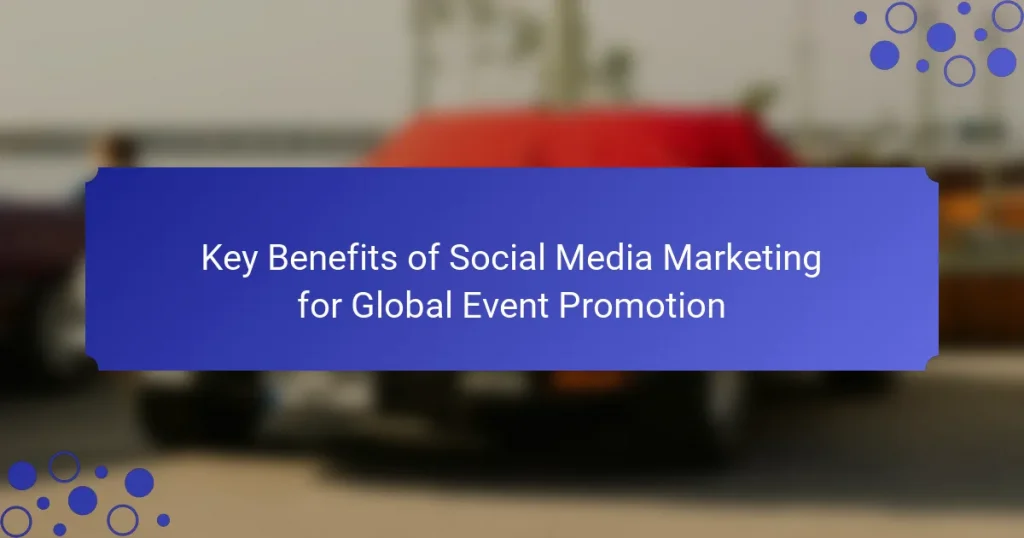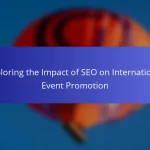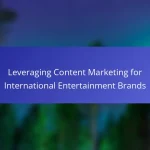Social media marketing significantly enhances global event promotion by increasing brand visibility and engagement. It allows for real-time interactions with potential attendees and facilitates targeted advertising to specific demographics. Key measurable outcomes of effective social media strategies include increased attendance, enhanced engagement through metrics such as likes and shares, and improved brand awareness. Best practices for successful social media marketing involve identifying target audiences, creating engaging content, utilizing hashtags, and monitoring analytics to refine strategies. Statistics indicate that a substantial percentage of event organizers recognize the effectiveness of social media in driving attendance and brand visibility.
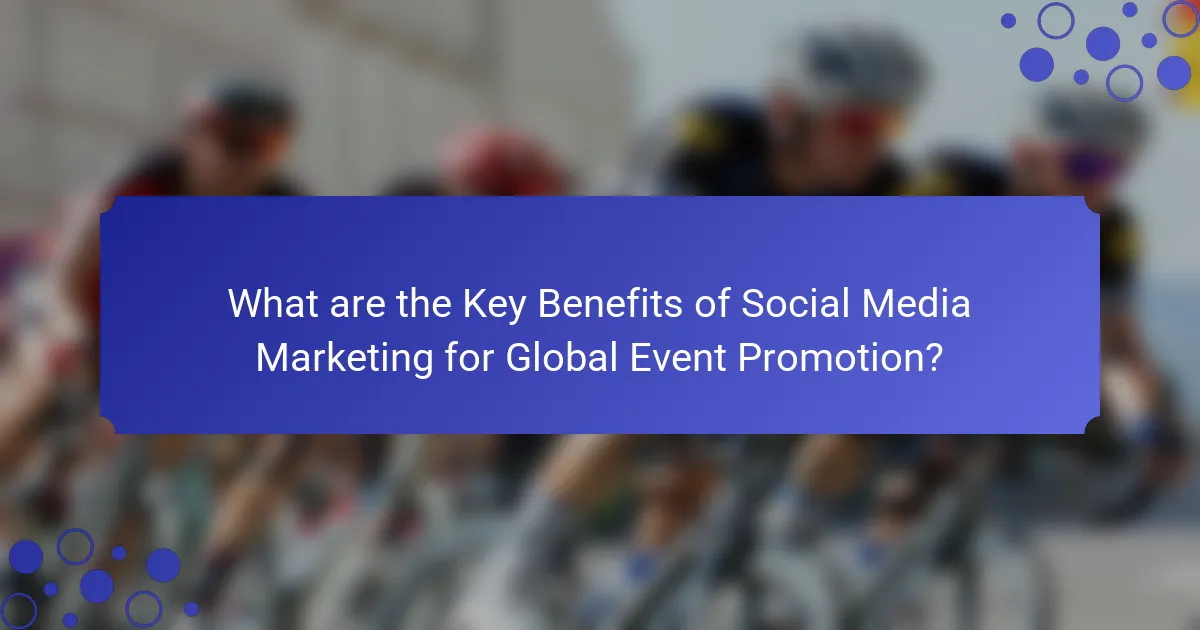
What are the Key Benefits of Social Media Marketing for Global Event Promotion?
Social media marketing offers several key benefits for global event promotion. It enhances brand visibility by reaching a vast audience across different platforms. Engagement rates are significantly higher on social media compared to traditional marketing methods. This allows for real-time interaction with potential attendees, fostering community and excitement. Social media also enables targeted advertising, ensuring that promotions reach specific demographics. Moreover, it provides valuable analytics to measure campaign effectiveness. According to a report by Statista, 54% of social media users utilize these platforms for event discovery. This data underscores the importance of social media in reaching and engaging potential event participants.
How does Social Media Marketing enhance event visibility?
Social media marketing enhances event visibility by increasing reach and engagement. It allows event organizers to share information with a broader audience. Platforms like Facebook, Instagram, and Twitter facilitate real-time updates. This engagement can lead to higher attendance rates. According to a 2020 study by Eventbrite, 79% of event creators use social media to promote their events. Social media also enables targeted advertising to specific demographics. This ensures that the event reaches the most relevant audience. User-generated content from attendees can further amplify visibility. This creates a community around the event, fostering excitement and participation.
What platforms are most effective for promoting global events?
Social media platforms are the most effective for promoting global events. Platforms like Facebook, Instagram, Twitter, and LinkedIn offer extensive reach to diverse audiences. Facebook allows event creation and targeted advertising, reaching billions of users. Instagram’s visual content is ideal for engaging audiences with event highlights. Twitter facilitates real-time updates and interactions, enhancing event visibility. LinkedIn is effective for professional events, targeting industry-specific audiences. According to a study by Eventbrite, 93% of event organizers use social media for promotion. This statistic underscores the reliance on these platforms for successful global event marketing.
How can targeted advertising improve event attendance?
Targeted advertising can significantly improve event attendance by reaching specific audiences likely to be interested in the event. This approach utilizes data analytics to identify demographics, interests, and behaviors of potential attendees. By tailoring ads to these segments, event organizers can increase engagement and relevance. Studies show that targeted ads can lead to a 50% increase in click-through rates compared to non-targeted ads. Additionally, personalized messaging resonates more with recipients, enhancing the likelihood of attendance. Effective targeting also optimizes advertising budgets by focusing resources on the most promising prospects. This leads to higher conversion rates, ultimately boosting overall attendance figures.
Why is audience engagement crucial in event promotion?
Audience engagement is crucial in event promotion because it drives awareness and participation. Engaged audiences share event information, amplifying reach through their networks. This organic sharing increases visibility and attracts more attendees. Furthermore, audience engagement fosters a sense of community and belonging. When potential attendees feel connected, they are more likely to attend. Statistics show that events with high engagement on social media see up to 50% higher attendance rates. Engaging content also enhances brand loyalty, encouraging repeat attendance for future events.
What strategies can be used to engage audiences on social media?
To engage audiences on social media, brands can utilize interactive content, live videos, and user-generated content. Interactive content, such as polls and quizzes, encourages audience participation. Live videos create a sense of immediacy and connection. User-generated content showcases authentic experiences, fostering community. According to a study by Sprout Social, 70% of consumers prefer brands that engage with them on social media. Consistent posting schedules also help maintain audience interest. Engaging visuals and storytelling can capture attention and enhance relatability. These strategies collectively enhance audience engagement and brand loyalty.
How does real-time interaction impact event success?
Real-time interaction significantly enhances event success by fostering engagement and participation. It allows attendees to connect instantly with organizers and each other. This immediacy can lead to increased satisfaction and a sense of community. According to a study by Eventbrite, events with high levels of attendee interaction see 30% higher satisfaction rates. Additionally, real-time feedback helps organizers make necessary adjustments on the spot. This adaptability can improve the overall experience for participants. Engaging content shared during the event can also amplify reach and visibility on social media platforms. Overall, real-time interaction is crucial for creating memorable and impactful events.
How does Social Media Marketing drive ticket sales for events?
Social media marketing drives ticket sales for events by increasing visibility and engagement. It allows event organizers to reach a broad audience quickly. Targeted ads on platforms like Facebook and Instagram can promote events to specific demographics. Engaging content, such as videos and images, captures attention and generates interest. Social media facilitates direct interaction between organizers and potential attendees. This interaction helps build excitement and community around the event. Additionally, sharing user-generated content can enhance credibility and encourage more ticket purchases. According to Eventbrite, 95% of event creators believe social media is effective for driving ticket sales.
What role do promotions and discounts play in ticket sales?
Promotions and discounts significantly boost ticket sales. They create a sense of urgency and encourage immediate purchases. Discounts attract price-sensitive customers who may not attend otherwise. Promotions can increase visibility and reach a wider audience through social media. For example, events offering early bird discounts often see higher initial sales. A study by Eventbrite shows that 35% of ticket buyers are motivated by discounts. Additionally, promotions can incentivize group sales, increasing overall attendance. This strategy can enhance customer loyalty and repeat attendance at future events.
How can user-generated content influence potential attendees?
User-generated content can significantly influence potential attendees by enhancing trust and engagement. When individuals share their experiences, it provides authentic insights into an event. This authenticity fosters a sense of community and belonging among potential attendees. Research shows that 79% of people say user-generated content highly impacts their purchasing decisions. Additionally, user-generated content often highlights unique aspects of an event, attracting diverse audiences. Positive testimonials and visuals can create excitement and anticipation. Ultimately, this content serves as a powerful marketing tool, driving higher attendance rates.
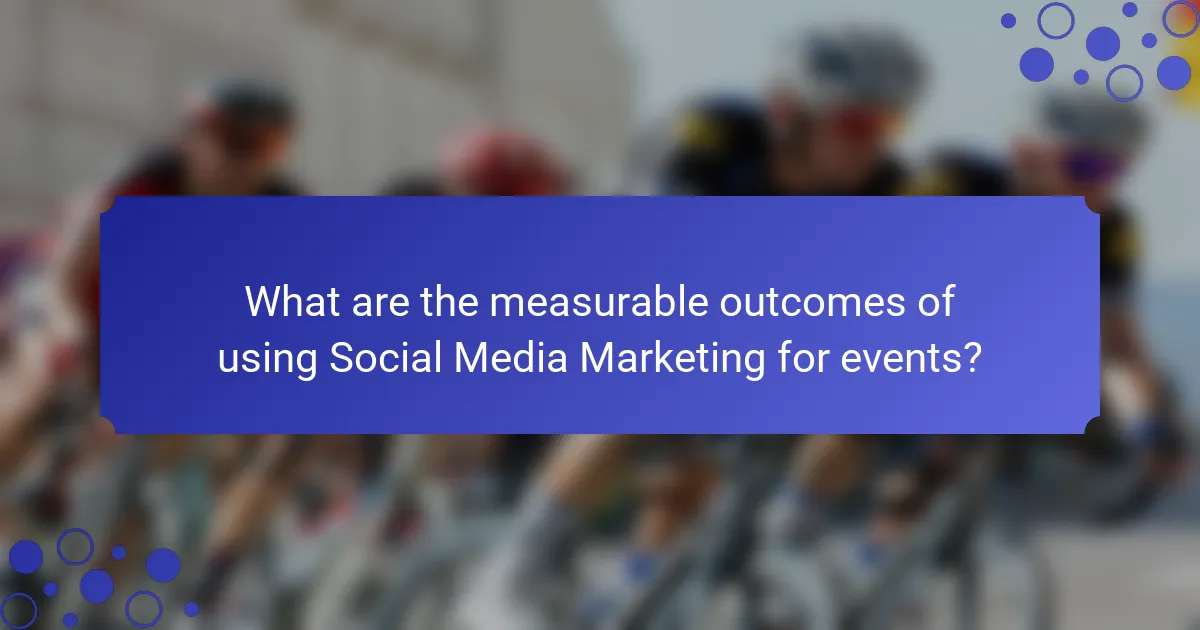
What are the measurable outcomes of using Social Media Marketing for events?
Measurable outcomes of using Social Media Marketing for events include increased attendance, enhanced engagement, and improved brand awareness. Increased attendance can be quantified by tracking ticket sales and RSVPs linked to social media campaigns. Enhanced engagement is measurable through metrics such as likes, shares, comments, and overall interaction rates on event posts. Improved brand awareness can be assessed by analyzing follower growth and reach metrics before and after the campaign. According to a study by Eventbrite, 60% of event organizers reported increased attendance due to social media promotions. Additionally, 78% of marketers believe social media is effective for increasing brand awareness. These statistics support the effectiveness of social media marketing in achieving measurable outcomes for events.
How can event organizers track the effectiveness of their social media campaigns?
Event organizers can track the effectiveness of their social media campaigns through analytics tools. These tools provide data on engagement metrics such as likes, shares, and comments. They also measure reach and impressions to analyze audience exposure. Conversion tracking helps assess how many users take desired actions. Event registration data can be correlated with social media activity. Additionally, surveys can gather feedback on how attendees discovered the event. According to a report by Hootsuite, 73% of marketers believe that social media has been effective for their business. This data supports the importance of tracking social media effectiveness in event promotion.
What metrics should be monitored for successful event promotion?
Key metrics for successful event promotion include engagement rates, reach, conversion rates, ticket sales, and return on investment (ROI). Engagement rates measure how actively users interact with promotional content. Reach indicates how many people see the event promotion. Conversion rates track the percentage of users who take a desired action, such as purchasing tickets. Ticket sales provide direct insight into event interest and success. ROI measures the financial return compared to the costs of promotion. Monitoring these metrics allows marketers to assess the effectiveness of their strategies and optimize future campaigns.
How can analytics improve future event marketing strategies?
Analytics can improve future event marketing strategies by providing data-driven insights. These insights help marketers understand audience behavior and preferences. For instance, analyzing past event attendance can reveal which demographics are most engaged. This allows for targeted marketing efforts in future campaigns. Additionally, analytics can track social media interactions, measuring the effectiveness of promotional content. By evaluating engagement metrics, marketers can refine their messaging. Furthermore, predictive analytics can forecast attendance trends based on historical data. This enables better resource allocation and planning for future events. Overall, leveraging analytics leads to more informed decision-making and improved event outcomes.
What challenges do event promoters face with Social Media Marketing?
Event promoters face several challenges with social media marketing. One major challenge is the saturation of content. Social media platforms are crowded, making it difficult for event promotions to stand out. Additionally, changing algorithms can limit the organic reach of posts. This unpredictability affects visibility and engagement rates.
Another challenge is targeting the right audience. Event promoters must accurately define and reach their desired demographics. Misalignment can lead to wasted resources and low attendance.
Moreover, measuring the effectiveness of social media campaigns can be complex. Promoters often struggle to link social media activity directly to ticket sales or event success.
Lastly, managing negative feedback or comments is essential. Promoters must respond promptly to maintain a positive image. Failure to do so can harm the event’s reputation.
How can negative feedback on social media be managed?
Negative feedback on social media can be managed through proactive engagement and timely responses. Organizations should monitor their social media channels regularly. This allows them to identify negative comments quickly. Acknowledging the feedback shows that the organization values customer opinions. Responding promptly can mitigate potential damage to the brand’s reputation. Offering solutions or clarifications can turn negative experiences into positive ones. According to a study by Sprout Social, 70% of consumers feel more positive about a brand after receiving a response to their complaint. This demonstrates the effectiveness of addressing negative feedback directly.
What are the common pitfalls in social media event promotion?
Common pitfalls in social media event promotion include inadequate planning and lack of audience targeting. Many promoters fail to define clear goals for their campaigns. This leads to ineffective messaging and poor engagement. Another issue is inconsistent branding across platforms. This confuses potential attendees and dilutes the event’s identity. Additionally, neglecting to create a content calendar can result in missed opportunities for promotion. Many promoters also overlook the importance of engaging with followers. Ignoring comments and messages can lead to a disconnect with the audience. Finally, not analyzing performance metrics can hinder future promotional efforts. Understanding what worked and what didn’t is crucial for improvement.
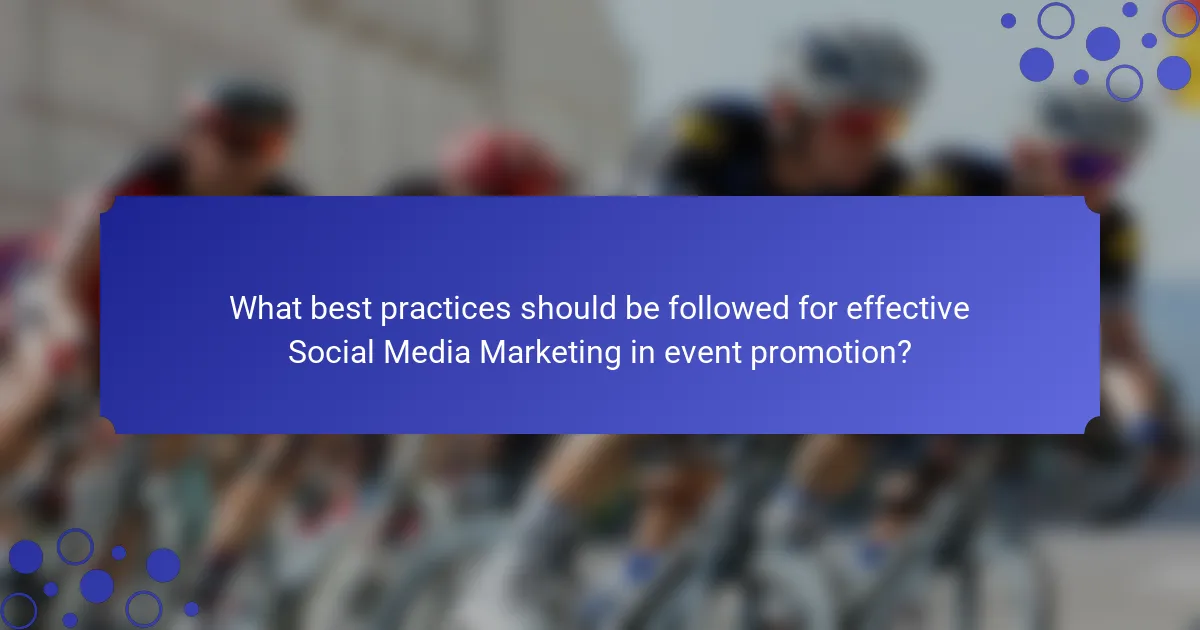
What best practices should be followed for effective Social Media Marketing in event promotion?
Effective social media marketing for event promotion involves several best practices. First, identify your target audience clearly. Understanding demographics helps tailor your content. Next, create engaging and shareable content. Visuals like images and videos increase engagement rates. Utilize hashtags strategically to boost visibility. Research shows that posts with relevant hashtags can increase engagement by 12.6%. Schedule posts at optimal times for your audience. Studies indicate that posts made on Thursdays and Fridays gain more traction. Encourage user-generated content to foster community and engagement. Incentives for sharing can enhance participation. Monitor analytics to assess performance and adjust strategies accordingly. Regular analysis leads to improved outcomes.
How can event organizers create engaging content for social media?
Event organizers can create engaging content for social media by utilizing visually appealing graphics and videos. High-quality images and short clips capture attention effectively. They should also share behind-the-scenes content to create a personal connection with the audience. Engaging storytelling about the event’s purpose and highlights fosters interest. Organizers can encourage user-generated content by creating hashtags and contests, increasing interaction. Live streaming during the event engages followers in real-time. Regular updates and countdowns build anticipation and excitement. According to a study by HubSpot, visual content is 40 times more likely to be shared on social media, validating the effectiveness of these strategies.
What types of content resonate most with event attendees?
Engaging and interactive content resonates most with event attendees. This includes live videos, polls, and Q&A sessions. Attendees prefer behind-the-scenes content that offers an exclusive look at the event. Visual content like images and infographics also captures attention effectively. User-generated content, such as testimonials and shared experiences, fosters community engagement. Educational content, including tips and industry insights, adds value for attendees. Statistics show that 80% of event attendees find interactive content more memorable. This preference indicates the importance of creating dynamic and participatory experiences for optimal engagement.
How important is timing in social media posts for event promotion?
Timing in social media posts is crucial for event promotion. Effective timing maximizes audience engagement and visibility. Research shows that posts made during peak hours receive significantly more interactions. For example, studies indicate that posts on Facebook during weekday afternoons yield higher engagement rates. Additionally, aligning posts with key milestones or countdowns to the event can create urgency and excitement. Strategic timing can lead to increased attendance and awareness for the event.
What are some tips for maximizing the impact of Social Media Marketing for global events?
Utilize targeted advertising to reach specific demographics effectively. Social media platforms offer advanced targeting options. This ensures your content reaches the audience most likely to engage. Create engaging and shareable content to boost visibility. High-quality visuals and compelling narratives attract more interactions. Use event-specific hashtags to enhance discoverability. Hashtags help users find relevant content quickly. Collaborate with influencers to expand your reach. Influencers can tap into their followers, increasing event awareness. Schedule posts strategically to maximize engagement. Analyzing peak activity times can optimize visibility. Monitor analytics to refine your strategy continuously. Data insights enable you to adjust content and timing for better results.
How can collaboration with influencers enhance event visibility?
Collaboration with influencers can significantly enhance event visibility. Influencers have established trust and credibility with their followers. This trust translates into higher engagement rates for event promotions. When influencers share event details, their audience is more likely to take notice. Statistics show that 49% of consumers depend on influencer recommendations. Their reach can extend to diverse demographics, increasing the event’s exposure. Additionally, influencers often create engaging content that showcases the event in a compelling way. This type of content can lead to increased ticket sales and attendance. Overall, influencer collaboration effectively amplifies event marketing efforts.
What are the benefits of using live streaming during events?
Live streaming during events enhances audience reach and engagement. It allows participants from various locations to join in real-time. This expands the event’s visibility beyond physical attendees. Engagement metrics show that live streams can increase interaction by up to 80%. Additionally, live streaming provides a platform for immediate feedback and questions. This interaction fosters a sense of community among viewers. Furthermore, recorded streams can be repurposed for future marketing efforts. Statistics indicate that 67% of viewers are more likely to make a purchase after watching a live stream.
The main entity of this article is social media marketing, specifically its key benefits for global event promotion. The article outlines how social media enhances brand visibility, engagement, and ticket sales while allowing for targeted advertising and real-time interaction with potential attendees. It discusses effective platforms for promotion, strategies for engaging audiences, and the importance of analytics in measuring campaign effectiveness. Additionally, it addresses challenges event promoters face and best practices for optimizing social media marketing efforts.
